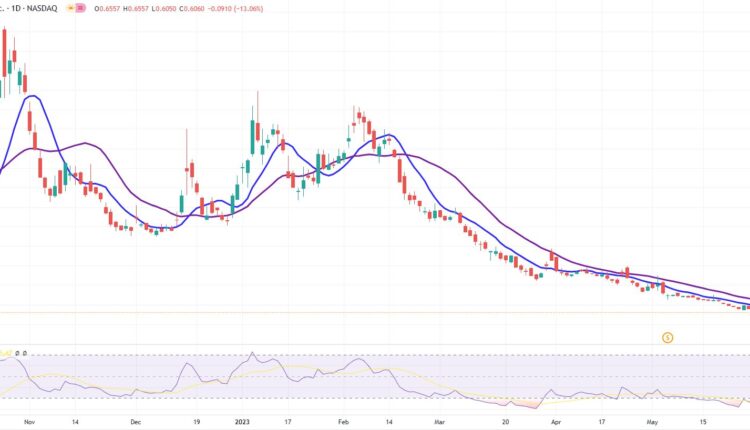Mullen Automotive stock below $0.60 after latest funding attempt
- Mullen Automotive issued pre-funded warrants, according to a filing to the SEC on Monday.
- MULN stock traded down to $0.6060 on Tuesday.
- NASDAQ futures are down in Wednesday's session.
- Lucid Group raised $3 billion in late May to fund its ambitious production growth.
Mullen Automotive (MULN) stock is down 10%, below $0.55 per stock, on early Wednesday trading, making new all-time lows. The NASDAQ is also on the wrong foot, losing almost 1% on the day at the time of writing. MULN stock previously dropped 13.1% on Tuesday to $0.6060. The continued sell-off this week despite any new headlines was likely caused by another round of dilution. On Monday, Mullen filed with the Securities & Exchange Commission (SEC) about a recent issuance of common stock and warrants to Acuitas Capital.
Mullen Automotive stock news: Acuitas Capital bought a lot of shares to dump
On June 5, Mullen sent a filing to the SEC explaining its latest funding initiative. Mullen requires lots of cash to meet production targets as it is currently ramping up its assembly line at a factory in Mississippi in order to build the Mullen Three, an electric long-haul truck chassis.
Right now its Mullen One electric delivery van is on the lot, awaiting orders at Randy Marion Automotive Group’s enterprise dealerships nationwide, but automotive production requires heavy investment. The much bigger Lucid Group (LCID), another EV maker in California that differs from Mullen due to its eye on the luxury segment of the market, just sold another $3 billion worth of common stock in order to burnish its production budget.
The June 5 filing shows that Acuitas Capital paid $20 million for 19,493,071 shares of MULN common stock and pre-funded warrants that can be exercised for 8,074,124 shares of common stock. The warrants can be exercised immediately at a price of $0.001 per share. Acuitas may already be exercising these warrants this week, thus causing the share price to drop precipitously.
Mullen separately issued Acuitas 50,999,310 warrants exercisable for common stock at a price of $0.7255 per share. As this price is above the current share price, Acuitas likely will have to wait awhile to exchange them for common shares. Altogether then, the Mullen filing means that the share count could expand by more than 78.5 million shares. Since there were 218 million shares at the end of the first quarter, considering the May 4 1-for-25 reverse stock split, this deal with Acuitas capital would itself dilute shares outstanding by about 36%.
Nasdaq FAQs
What is the Nasdaq?
The Nasdaq is a stock exchange based in the US that started out life as an electronic stock quotation machine. At first, the Nasdaq only provided quotations for over-the-counter (OTC) stocks but later it became an exchange too. By 1991, the Nasdaq had grown to account for 46% of the entire US securities’ market. In 1998, it became the first stock exchange in the US to provide online trading. The Nasdaq also produces several indices, the most comprehensive of which is the Nasdaq Composite representing all 2,500-plus stocks on the Nasdaq, and the Nasdaq 100.
What is the Nasdaq 100?
The Nasdaq 100 is a large-cap index made up of 100 non-financial companies from the Nasdaq stock exchange. Although it only includes a fraction of the thousands of stocks in the Nasdaq, it accounts for over 90% of the movement. The influence of each company on the index is market-cap weighted. The Nasdaq 100 includes companies with a significant focus on technology although it also encompasses companies from other industries and from outside the US. The average annual return of the Nasdaq 100 has been 17.23% since 1986.
How can I trade the Nasdaq 100?
There are a number of ways to trade the Nasdaq 100. Most retail brokers and spread betting platforms offer bets using Contracts for Difference (CFD). For longer-term investors, Exchange-Traded Funds (ETFs) trade like shares that mimic the movement of the index without the investor needing to buy all 100 constituent companies. An example ETF is the Invesco QQQ Trust (QQQ). Nasdaq 100 futures contracts allow traders to speculate on the future direction of the index. Options provide the right, but not the obligation, to buy or sell the Nasdaq 100 at a specific price (strike price) in the future.
What Factors Drive the Nasdaq 100
Many different factors drive the Nasdaq 100 but mainly it is the aggregate performance of the component companies revealed in their quarterly and annual company earnings reports. US and global macroeconomic data also contributes as it impacts on investor sentiment, which if positive drives gains. The level of interest rates, set by the Federal Reserve (Fed), also influences the Nasdaq 100 as it affects the cost of credit, on which many corporations are heavily reliant. As such the level of inflation can be a major driver too as well as other metrics which impact on the decisions of the Fed.
Mullen stock forecast
Mullen stock has been setting new all-time lows since early March, and there is no reason for it to stop in the near term. Mullen burned about $68 million in the first quarter of this year, and that figure should rise as it begins production of the Mullen Three in July. Expect MULN stock to fall back to its pre-reverse stock split price of $0.06 before entreaties from the NASDAQ exchange cause management to file for another reverse stock split. NASDAQ-listed companies are not allowed to trade below $1 for an extended period of time.
MULN daily chart


Comments are closed.